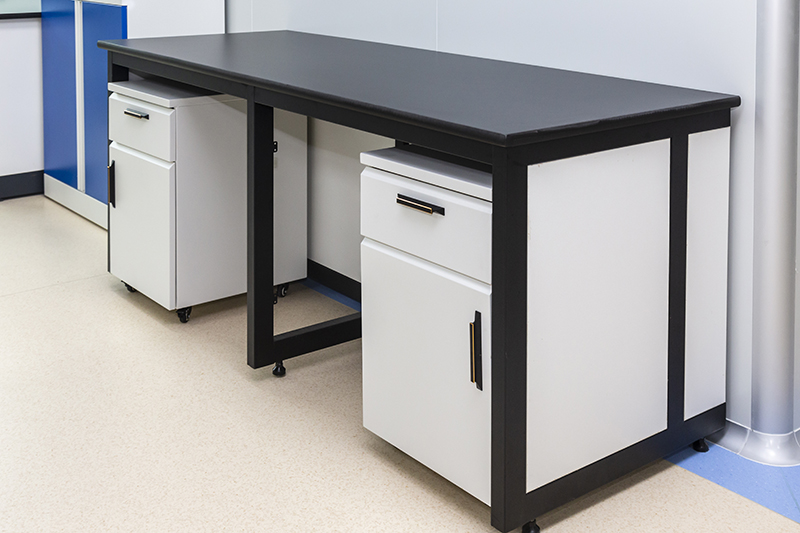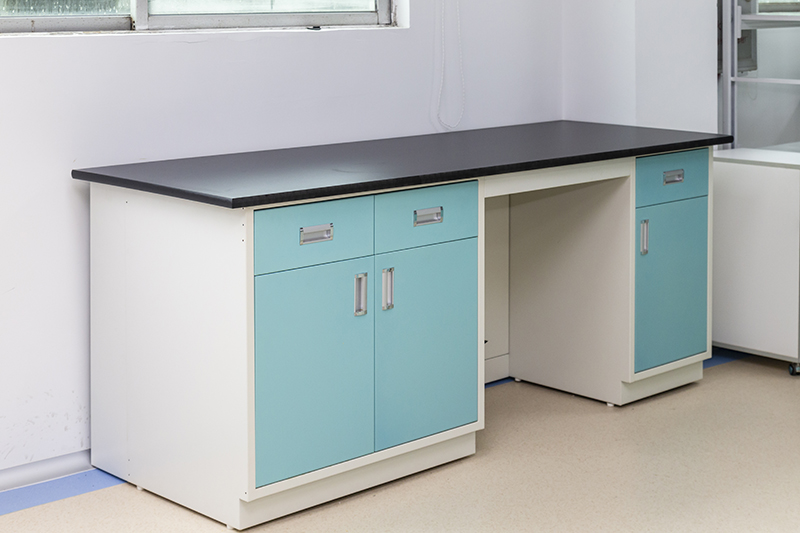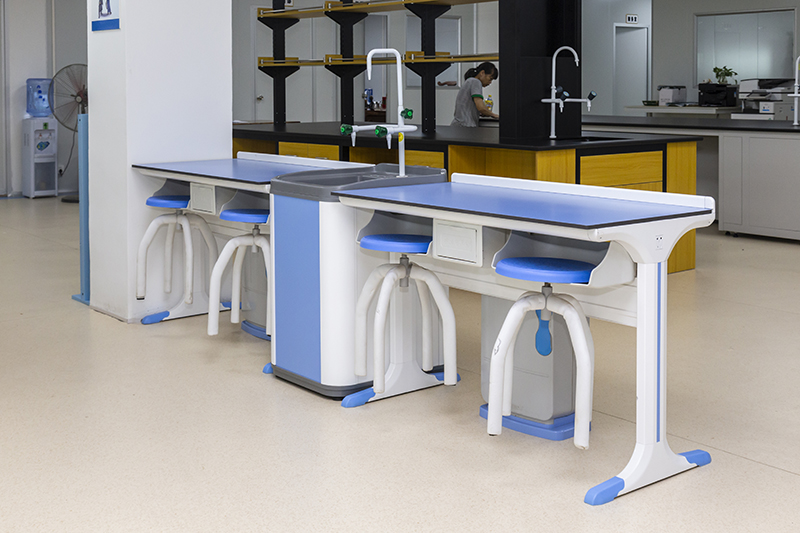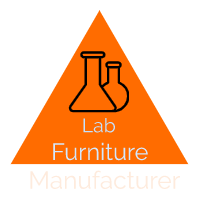Lab Table
Discover our premium lab tables designed for modern laboratories. Built with industrial-grade materials, adjustable, customizable, and eco-friendly, our lab tables offer unmatched durability, versatility, and safety. Perfect for scientific research, pharmaceutical labs, educational institutions, and industrial settings. Enhance your lab’s efficiency and aesthetics with our top-quality lab tables.
Elevate Your Laboratory with Our Premium Lab Tables

Discover unmatched quality, durability, and functionality tailored to meet the highest standards of scientific and industrial environments.


Features That Make a Difference
- Sturdy and Durable: Built with industrial-grade materials for long-lasting performance.
- Adjustable and Ergonomic: Height-adjustable design for optimal comfort and productivity.
- Smooth, Chemical-Resistant Surface: Easy-to-clean, non-porous surface that withstands rigorous lab work.
- Modular and Customizable: Tailor your lab table with integrated power supplies, built-in lighting, and more.
- Mobile and Portable: Easily relocate your table within your workspace.
- Safety and Compliance: Safety-certified and environmentally friendly.
Why Choose Our Lab Tables?
- Enhanced Durability: Reinforced construction supports substantial weight and heavy use.
- Versatile Applications: Ideal for scientific research, clinical work, and educational purposes.
- Optimal Organization: Integrated storage solutions keep your workspace clutter-free.
- Safety First: Anti-static, noise-dampening, and fire-resistant properties ensure a safe working environment.
- Eco-friendly: Sustainable materials and manufacturing processes.
The Advantage of Choosing Our Lab Tables
- Precision Engineering: Crafted with meticulous attention to detail for consistent quality.
- High Load Capacity: Supports heavy equipment without compromising stability.
- Future-proof Design: Modular features allow for easy expansion and reconfiguration.
- Aesthetic Appeal: Sleek, contemporary design enhances the visual appeal of your lab.
- Reduced Maintenance: Durable construction and easy-to-clean surfaces reduce maintenance needs.
Ideal for Various Laboratory Settings
- Scientific Research: Perfect for analytical, chemical processing, and microbiological work.
- Pharmaceutical: Suitable for drug development and testing laboratories.
- Educational: Enhances the learning environment in school and university labs.
- Clinical: Supports various diagnostic and research activities in medical laboratories.
- Industrial: Meets the needs of industrial laboratories with robust performance.
What Our Clients Say
“These lab tables are top-notch! They’ve transformed our workspace and improved our efficiency.” – Dr. Smith, Biotech Labs
“Highly recommend these lab tables for their durability and customization options.” – Prof. Johnson, University of Science
“The best investment we’ve made for our lab. Excellent quality and superb service.” – Ms. Brown, Pharmaceutical Research
Ready to Transform Your Laboratory?
Get in touch with us to discuss your specific needs and find the perfect lab table for your workspace.
Lab Table FAQ
1. What materials are lab tables typically made of?
Lab tables are constructed from a variety of materials depending on their intended use. Common materials include:
- Stainless Steel: Highly resistant to corrosion and easy to clean, ideal for sterile environments.
- Phenolic Resin: Durable and resistant to chemicals, making it perfect for harsh laboratory conditions.
- Epoxy Resin: Known for its strength and resistance to heat, chemicals, and moisture.
- Polypropylene: Lightweight, chemical-resistant, and easy to clean, suitable for less demanding environments.
2. How do I choose the right lab table for my needs?
Choosing the right lab table depends on several factors:
- Intended Use: Consider the types of experiments or work you will conduct. For example, chemical labs may need tables resistant to corrosive substances, while electronics labs may prioritize anti-static surfaces.
- Durability Requirements: Evaluate the environmental conditions, such as exposure to chemicals, heat, or moisture, and choose materials accordingly.
- Budget: Balance your needs with your budget, ensuring you invest in quality where it matters most.
3. Can lab tables be customized?
Yes, many manufacturers offer customization options for lab tables, including:
- Size and Dimensions: Tailor the table to fit your space requirements.
- Material Selection: Choose from various surface materials depending on your specific needs.
- Storage Options: Add drawers, shelves, or cabinets for extra storage.
- Mobility: Opt for tables with wheels for easy relocation within the lab.
4. What is the length of the lab table?
The length of a lab table can vary depending on its intended use and the space available in the laboratory. However, standard lab tables typically come in the following lengths:
- 4 feet (48 inches or ~122 cm): Common for smaller workspaces or where multiple tables need to be arranged in sequence.
- 5 feet (60 inches or ~152 cm): A versatile size that fits well in most labs.
- 6 feet (72 inches or ~183 cm): Often used in larger labs or for tasks requiring more workspace.
- 8 feet (96 inches or ~244 cm): Suitable for larger setups or when working with multiple pieces of equipment simultaneously.
Custom lengths can also be ordered to meet specific laboratory requirements. When choosing a table length, consider the layout of your lab, the number of users, and the type of work being performed.
5. How do I maintain and clean my lab table?
Proper maintenance and cleaning will extend the life of your lab table:
- Daily Cleaning: Use a soft cloth with mild detergent for daily cleaning. Avoid abrasive cleaners that could damage the surface.
- Spill Management: Immediately clean up any chemical spills to prevent staining or damage.
- Periodic Maintenance: Check for any signs of wear or damage and address them promptly to avoid bigger issues.
6. Are lab tables resistant to chemicals and heat?
Most lab tables are designed to be resistant to chemicals and heat, but the level of resistance depends on the material:
- Epoxy Resin: Excellent resistance to both chemicals and heat, making it suitable for most lab environments.
- Phenolic Resin: Offers strong chemical resistance and can handle high temperatures.
- Stainless Steel: Provides good heat resistance and is moderately resistant to chemicals, especially in non-corrosive environments.
7. What weight capacity should I consider for a lab table?
Lab tables are built to support heavy equipment, but the weight capacity varies:
- Light-Duty Tables: Typically support up to 500 pounds, suitable for lighter equipment and general use.
- Medium-Duty Tables: Can support between 500 to 1,000 pounds, ideal for most lab setups.
- Heavy-Duty Tables: Support over 1,000 pounds, perfect for labs with heavy machinery or equipment.
8. Do lab tables come with warranties?
Most lab tables come with a warranty that can range from 1 to 10 years, depending on the manufacturer and the materials used. It’s important to review the warranty details to understand what is covered and for how long.
9. Can lab tables be used in different types of laboratories?
Yes, lab tables are versatile and can be used in various types of laboratories, including:
- Chemical Laboratories: Where resistance to chemicals is critical.
- Biological Laboratories: Where ease of cleaning and sterilization are important.
- Physics and Engineering Labs: Where sturdy surfaces and the ability to hold heavy equipment are needed.
10. Are lab tables ergonomic?
Many lab tables are designed with ergonomics in mind:
- Height-Adjustable: Some models offer adjustable height features to accommodate different tasks and users.
- Comfort Features: Rounded edges and footrests can be included to improve comfort during long periods of work.
11. How do I ensure the lab table meets safety standards?
Ensure your lab table meets industry safety standards by checking for certifications such as:
- ANSI/ASHRAE: For standards related to laboratory ventilation and safety.
- OSHA Compliance: Ensuring the table meets Occupational Safety and Health Administration regulations.
- ISO Certifications: Look for tables that comply with ISO standards relevant to laboratory environments.
